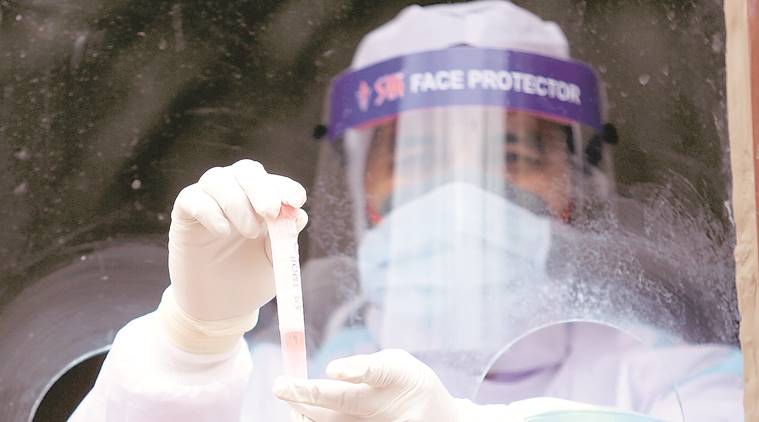
The Indian Express
Challenge to plasma therapy: Getting donors to come forward
According to sources, over 440 people were contacted by the Delhi government to donate plasma, out of which around 15 agreed. As many as 7,264 people have recovered/migrated/been discharged from hospitals as of May 27.
by Astha SaxenaA month after the Delhi government received permission to start clinical trials for convalescent plasma therapy on Covid-19 patients, getting donors to come forward remains a challenge.
According to sources, over 440 people were contacted by the Delhi government to donate plasma, out of which around 15 agreed. As many as 7,264 people have recovered/migrated/been discharged from hospitals as of May 27.
In Delhi, seven institutes — All India Institute of Medical Sciences (AIIMS); Maulana Azad Medical College (MAMC) in coordination with Institute of Liver and Biliary Sciences (ILBS); Indraprastha Apollo Hospital; Batra Hospital; Lady Hardinge Medical College; Ram Manohar Lohia (RML) Hospital; and Max Hospital Saket — have been approved to participate in the trials, and have been trying hard to motivate patients who have recovered to donate plasma.
The Delhi government-run Lok Nayak Hospital has completed the first phase of clinical trials on 20 Covid-19 patients. Those who have recovered and been discharged from the hospital are being counselled by experts and, if they agree, are referred to ILBS for donating plasma. Once the plasma is donated, it is sent to Lok Nayak to be administered to patients.
“There is a need for awareness among people. We are counselling them at the hospital during discharge, many agree to donate their plasma as well. But when they reach home, after discussing it with the family members, their decision changes. There is still a stigma among people regarding the therapy. Fearful of catching the infection again, many of them don’t want to visit hospitals,” said a senior doctor from Lok Nayak.
A right donor, as per the criteria, is a healthy person in the age group of 18-60 years with no comorbidities. The donor should have crossed three weeks after recovery and tested negative for Covid-19 twice.
According to sources, of the 440 people contacted, most were unfit for donation due to their age or underlying medical conditions, while some refused to donate citing various reasons.
“Many donors have conditions like diabetes, hypertension and are not fit to be donors. Those who are above the age of 50 have many illnesses and can’t donate plasma. Many still have post-illness trauma and are not comfortable. Similarly, pregnant patients are not fit to be donors,” said a senior official from the health department.
Asked about the therapy, Dr S K Sarin, head of ILBS, said, “It is not approved for routine use yet. Let the government take a decision on it.”
At AIIMS Jhajjar, where many patients with mild and moderate symptoms are admitted, there have been around four-five plasma donations. “We are motivating people to donate plasma but not many are coming forward in the trial,” said Dr Sushma Bhatnagar, chairperson of Covid-19 services at the Jhajjar hospital.
Max Hospital, Saket had used the therapy on two patients in April. While one died, the other has shown improvement. So far, 20 patients at the hospital have been administered the therapy.
On April 16, the Delhi government received a go-ahead from ICMR to use plasma therapy, with Chief Minister Arvind Kejriwal appealing to those who have recovered to come forward and donate plasma.
The Union Ministry of Health and Family Welfare has said the therapy is not approved treatment and is among several options being explored.
Plasma therapy uses antibodies found in the blood of people who have recovered from the infection (or convalesced) to treat patients who are infected. In this therapy, blood is drawn from a person who has recovered from the disease, and the serum is separated and screened for virus-neutralising antibodies. The therapy is yet to begin at the other four hospitals.